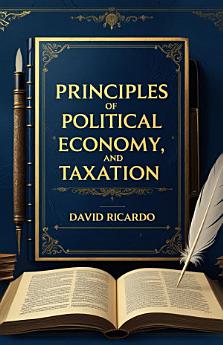On The Principles of Political Economy, and Taxation
Jul 2025 · BEYOND BOOKS HUB
Ebook
252
Pages
reportRatings and reviews aren’t verified Learn More
About this ebook
David Ricardo's On the Principles of Political Economy, and Taxation (1817) is a foundational work in classical economics and one of the most influential economic treatises in history. Through rigorous reasoning and clear exposition, Ricardo introduces several groundbreaking concepts that shaped the field of political economy, including the law of comparative advantage, the theory of rent, and insights into the distribution of income among landowners, capitalists, and laborers. The book opens with a thorough analysis of value, distinguishing between natural and market prices, and explaining how labor inputs determine the value of commodities in a competitive economy. Ricardo then presents his famous theory of rent, arguing that land rent arises from differences in fertility and location, not from landlords’ efforts. His critiques of taxation—whether on wages, profits, houses, or commodities—showcase a nuanced understanding of fiscal policy's effects on economic classes. Chapters on foreign trade, currency, wages, profits, and capital accumulation reveal Ricardo’s prescience in anticipating core issues of globalization and income inequality. In his discussion of Mr. Malthus's theories, he debates the population doctrine and the dynamics of rent, offering sharp counterpoints that continue to inform economic dialogue. This work is essential not only for students of economics but for historians, policymakers, and anyone interested in the philosophical and practical underpinnings of capitalism. Ricardo’s analytic method set the stage for modern economic thought, influencing thinkers such as Karl Marx, John Stuart Mill, and contemporary free-trade theorists.
About the author
David Ricardo (1772–1823) was a British political economist and one of the most influential figures in the classical school of economics. A successful stockbroker turned economic theorist, Ricardo made lasting contributions through his theories of value, rent, and trade. His ideas laid the foundation for modern economic thought and were pivotal in shaping free-market doctrines and fiscal policy frameworks.
Rate this ebook
Tell us what you think.
Reading information
Smartphones and tablets
Install the Google Play Books app for Android and iPad/iPhone. It syncs automatically with your account and allows you to read online or offline wherever you are.
Laptops and computers
You can listen to audiobooks purchased on Google Play using your computer's web browser.
eReaders and other devices
To read on e-ink devices like Kobo eReaders, you'll need to download a file and transfer it to your device. Follow the detailed Help Center instructions to transfer the files to supported eReaders.








